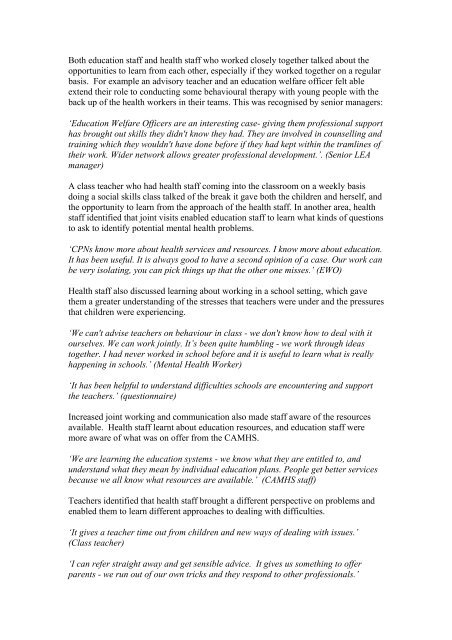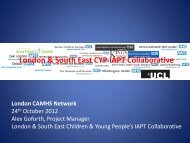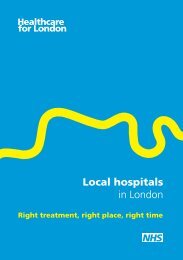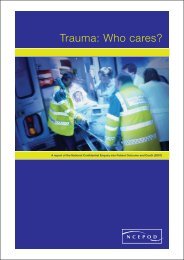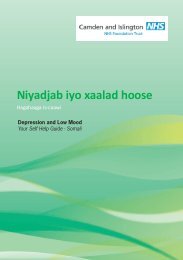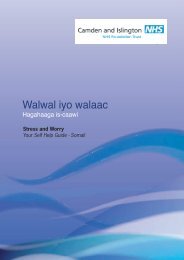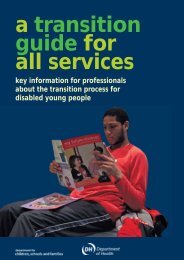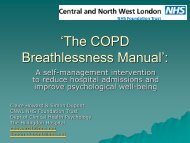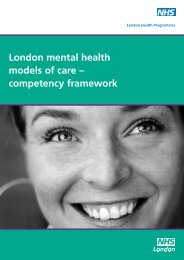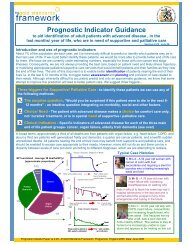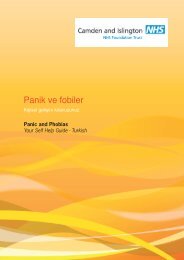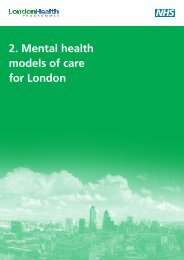(CAMHS) and Schools - London Health Programmes
(CAMHS) and Schools - London Health Programmes
(CAMHS) and Schools - London Health Programmes
You also want an ePaper? Increase the reach of your titles
YUMPU automatically turns print PDFs into web optimized ePapers that Google loves.
Both education staff <strong>and</strong> health staff who worked closely together talked about the<br />
opportunities to learn from each other, especially if they worked together on a regular<br />
basis. For example an advisory teacher <strong>and</strong> an education welfare officer felt able<br />
extend their role to conducting some behavioural therapy with young people with the<br />
back up of the health workers in their teams. This was recognised by senior managers:<br />
‘Education Welfare Officers are an interesting case- giving them professional support<br />
has brought out skills they didn't know they had. They are involved in counselling <strong>and</strong><br />
training which they wouldn't have done before if they had kept within the tramlines of<br />
their work. Wider network allows greater professional development.’. (Senior LEA<br />
manager)<br />
A class teacher who had health staff coming into the classroom on a weekly basis<br />
doing a social skills class talked of the break it gave both the children <strong>and</strong> herself, <strong>and</strong><br />
the opportunity to learn from the approach of the health staff. In another area, health<br />
staff identified that joint visits enabled education staff to learn what kinds of questions<br />
to ask to identify potential mental health problems.<br />
‘CPNs know more about health services <strong>and</strong> resources. I know more about education.<br />
It has been useful. It is always good to have a second opinion of a case. Our work can<br />
be very isolating, you can pick things up that the other one misses.’ (EWO)<br />
<strong>Health</strong> staff also discussed learning about working in a school setting, which gave<br />
them a greater underst<strong>and</strong>ing of the stresses that teachers were under <strong>and</strong> the pressures<br />
that children were experiencing.<br />
‘We can't advise teachers on behaviour in class - we don't know how to deal with it<br />
ourselves. We can work jointly. It’s been quite humbling - we work through ideas<br />
together. I had never worked in school before <strong>and</strong> it is useful to learn what is really<br />
happening in schools.’ (Mental <strong>Health</strong> Worker)<br />
‘It has been helpful to underst<strong>and</strong> difficulties schools are encountering <strong>and</strong> support<br />
the teachers.’ (questionnaire)<br />
Increased joint working <strong>and</strong> communication also made staff aware of the resources<br />
available. <strong>Health</strong> staff learnt about education resources, <strong>and</strong> education staff were<br />
more aware of what was on offer from the <strong>CAMHS</strong>.<br />
‘We are learning the education systems - we know what they are entitled to, <strong>and</strong><br />
underst<strong>and</strong> what they mean by individual education plans. People get better services<br />
because we all know what resources are available.’ (<strong>CAMHS</strong> staff)<br />
Teachers identified that health staff brought a different perspective on problems <strong>and</strong><br />
enabled them to learn different approaches to dealing with difficulties.<br />
‘It gives a teacher time out from children <strong>and</strong> new ways of dealing with issues.’<br />
(Class teacher)<br />
‘I can refer straight away <strong>and</strong> get sensible advice. It gives us something to offer<br />
parents - we run out of our own tricks <strong>and</strong> they respond to other professionals.’


